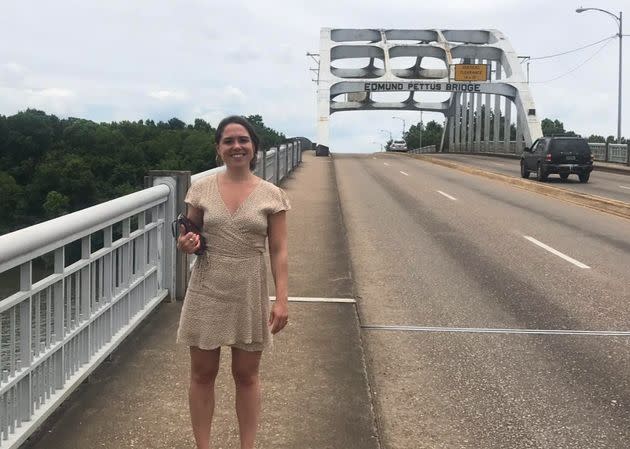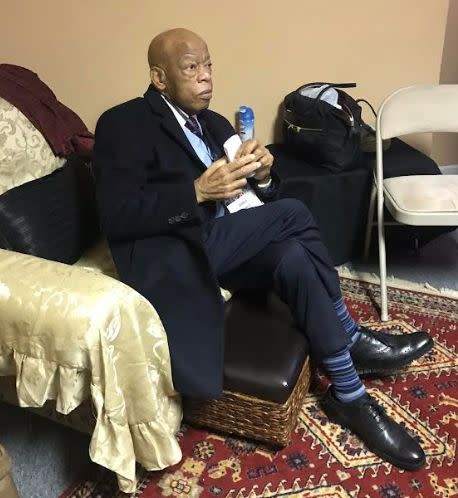
The author at The Nick, a local bar, in Birmingham, Alabama.
In July of 2018, I arrived in Huntsville, Alabama, sight unseen.
My 2009 Honda Accord was packed to the brim with the contents of my Bushwick, New York, apartment, which had started to feel like a distant memory somewhere in the rolling, monotonous beauty of the Smokies. The trunk held garbage bags stuffed with clothing and liquor boxes filled with books. In the backseat was bedding, framed art and a coffee table my uncle made in the 1980s. My plan was to stay for five months ― through the end of the midterm elections ― and then return to the life I had been living in Brooklyn for the better part of a decade.
I had only been down to Alabama once before, several months prior, to volunteer at the Equal Justice Initiative’s opening of its museum dedicated to victims of lynching. It was there that I met Alabama’s Democratic House minority leader, who offered me a job working on the midterms. It was also there, in the Red Roof Inn on Zelda Road, that I picked up a mean case of bedbugs, which left itchy welts across my face and arms that took weeks to disappear.
Now I was headed to meet Alice, a volunteer on the campaign who had offered to put me up for a few nights and rent me an apartment at one of the properties she owned in downtown Huntsville. The rent was $400 per month for a large one bedroom ― less than half of what I had paid for my portion of the dilapidated two-bedroom I’d been renting in Brooklyn.
Alice and her wife lived about 20 minutes outside of Huntsville in Harvest, an unincorporated rural community. Driving around Huntsville, which I had been told would soon be the largest city in Alabama, I wondered Where’s the city part? The sight of cotton fields sent chills down my spine, and by the time I arrived at Alice’s, I was fundamentally questioning my decision to move.
I was not a professional campaign worker. In fact, this was my first job in politics. Until Donald Trump was elected president in 2016, I had been working in book publishing, teaching yoga and generally enjoying the many privileges that my whiteness allowed me. Like so many New York City liberals, that election had been a wakeup call, and I’d committed myself to doing more, to educating myself, to fighting for the rights I’d naively thought were guaranteed.
I’d read myriad think pieces about how we needed to spend more time in those parts of the country that had voted for Trump. But if Hillary Clinton couldn’t even be bothered to go to Wisconsin, did I really need to uproot my life and move to Alabama?

The scene in Harvest, Alabama, outside of Huntsville.
Growing up in New Jersey, I knew about as much about the South as I did about Timbuktu. When I applied to Tulane University, my grandmother, a die-hard New Yorker, said without a hint of sarcasm, “But you know you can’t get a decent education below the Mason-Dixon line.” The bedbugs were surprising to no one ― my decision to move was a shock.
With some trepidation, I let myself into Alice’s house using her keypad and waited for her to come home. The campaign was in full swing, so I occupied the afternoon with calls, fundraising emails and drafting the paperwork for a 501(c)3 tax-exempt organization.
When Alice arrived, we greeted each other cautiously. We’d spoken many times on the phone, mostly about campaign-related business, and her low voice, thick accent and easy demeanor immediately put me at ease. She was understandably more skeptical of me. What was a girl from New Jersey with no prior work experience in politics doing down here in Alabama?
Over dinner and bourbon, we got to know each other. I told her about my family, the guy I was dating and my desire to find more meaningful work. Alice shared her struggle to lift herself out of rural poverty and become the vice president of a major tech company, and the difficulties she’d faced in coming out. We began to develop a friendship.
As part of my Alabama education, Alice pulled out a white board to explain the state’s deepest political divide. On one side she wrote “Alabama.” On the other side she wrote “Auburn,” with a line dividing the two. Under Alabama, she wrote “Roll Tide”; under Auburn, “War Eagle.”
“I don’t get it,” I said. “Why is one team called ‘Alabama’ if both teams are in Alabama? And why is Auburn’s chant ‘War Eagle’ if their mascot is the tigers?”
Alice looked at me like I had two heads.
“What’s not to get?” She asked. “I think you’ve had too much bourbon.”
Football as religion was just one of many cultural discoveries I made over those first months in Alabama, the majority of which could be easily packaged into an early-aughts rom-com. Meat and three’s, Jason Isbell and chatting with people in line at the grocery store were all foreign concepts, and I reveled in their discovery. Well, everything except football.
Alice was my first friend, but I quickly made more, and before long Alabama began to feel like home.

The author on the Edmund Pettus Bridge in Selma, Alabama, where voting rights protesters marched on Bloody Sunday in 1965.
The campaign was busy, but the work felt meaningful. We hoped to capitalize on Doug Jones’ historic Senate win and break the Republican supermajority in the state house ahead of the census and redistricting. Since state lawmakers are responsible for drawing up voting districts, it was crucial that we win in districts across the state where Democrats had not only lost but in many cases had not even run a candidate for many years. Given the state’s history of civil rights organizing and voter suppression, the task felt especially vital.
During the campaign, I visited New York frequently, on both personal and fundraising trips. Each time I came up, I was surprised by how little I missed the city and how eager I was to return to Alabama. The energy and schlep of the city that had energized me throughout my 20s felt draining, and the disdain with which so many Northeasterners treated my new home felt frustrating.
At a fundraising event in lower Manhattan, I told the host about my recent move. He simply responded, “I’m sorry.”
Almost no one I knew had ever visited Alabama, and most seemed to think that the state was populated by illiterate Trump supporters who didn’t wear shoes. The grace that well-meaning liberals offered the Midwest did not extend to a state whose reputation had been solidified during the civil rights movement. Most people I spoke with still associated Alabama with Gov. George Wallace’s proclamation of “segregation forever” and Bull Connor’s assault on peaceful protesters with dogs and fire hoses.
Though Alabama’s brutal, racist history is very much alive and undeniably woven into the fabric of the state, it is far from unique to Alabama. I was consistently surprised by the smugness with which Northeasterners talked about Alabama without any apparent awareness of our own region’s history of racism or, more strikingly, the state’s equally potent history of activism. In sneering at the state as a whole, people seemed not to realize that they were also sneering at activists, organizers and everyday people working to make the best with what little resources they might have.
The joke that Alabamians are shoeless and illiterate is much less funny when you consider the state’s history of racism and lack of job opportunities or public school funding.

Yard signs at one of Sen. Doug Jones’ COVID-19 drive-in rallies.
Following a brutal midterm loss, I decided to stay in Alabama and work for the state House Democratic Caucus. When the session ended, I went to work for Terri Sewell, our sole Democrat in the U.S. House of Representatives, and then on Doug Jones’ second Senate race. I moved to Birmingham, fell in love and bought a house. I got engaged, started teaching yoga again and completed a master’s program in journalism at the University of Alabama. Before long, 4½ years had passed and I had built a life for myself.
To my friends and family up North, my decision to stay was even more confusing than my initial decision to leave. Then, I had been on a mission with a clear goal and end date. Now, I was just… living?
Gradually, more friends and family came down to visit and started to understand the appeal. The pace down here is slower, the food is excellent and history is everywhere. Politically and culturally, the state is still deeply conservative, but I found a group of friends (largely through political work) whose progressive ideals align with my own. We joke that the only time Alabama makes positive national news is for football, but within challenge and struggle, there is also beauty and culture. Social justice and equity work become more potent in the face of clear and vocal enemies.
As a country, we are still mired in the work of consensus building. We are still deeply and fundamentally divided. Partially, I believe the issue is one of exposure. The echo chambers of social media and online news are further isolating and entrenching people in their beliefs and, despite the commitments many of us made to understanding those with opposing viewpoints, it’s easier to hand-wring with likeminded friends.
Rep. Marjorie Taylor Greene (R-Ga.) recently made headlines for proposing a “national divorce” between red and blue states. Though pundits were quick to ridicule her, it’s a sentiment I’ve often heard in casual conversation with Northern friends on the left. “If the South is going to hold us back from meaningful climate and social progress, why not just let them secede?”
The answer, in simple terms, is that separation hurts those with the least. If creating a fairer, more equitable society is truly what we as progressives care about, then we have a responsibility not to pull away but to lean in.
We’ve seen what leaning in has done in Georgia, but it took Stacey Abrams and many other organizers and activists well over a decade to implement the internal structures that have turned Georgia purple. And still the fight continues. There is still so much important work to be done and so many people fighting to hold on to the ugliness of the past. Dismissing Alabama or the South as a whole does nothing to advance that work; it only confirms to people down here that they have been left behind.

A photo the author took of Rep. John Lewis in Selma, Alabama, a few weeks before he died.
Ellen Gomory is a New Jersey native living in Birmingham, Alabama. She is passionate about storytelling, progressive politics, the Real Housewives and her pug, Eloise. You can find her lurking on Twitter @ellengomory.
Do you have a compelling personal story you’d like to see published on HuffPost? Find out what we’re looking for here and send us a pitch.